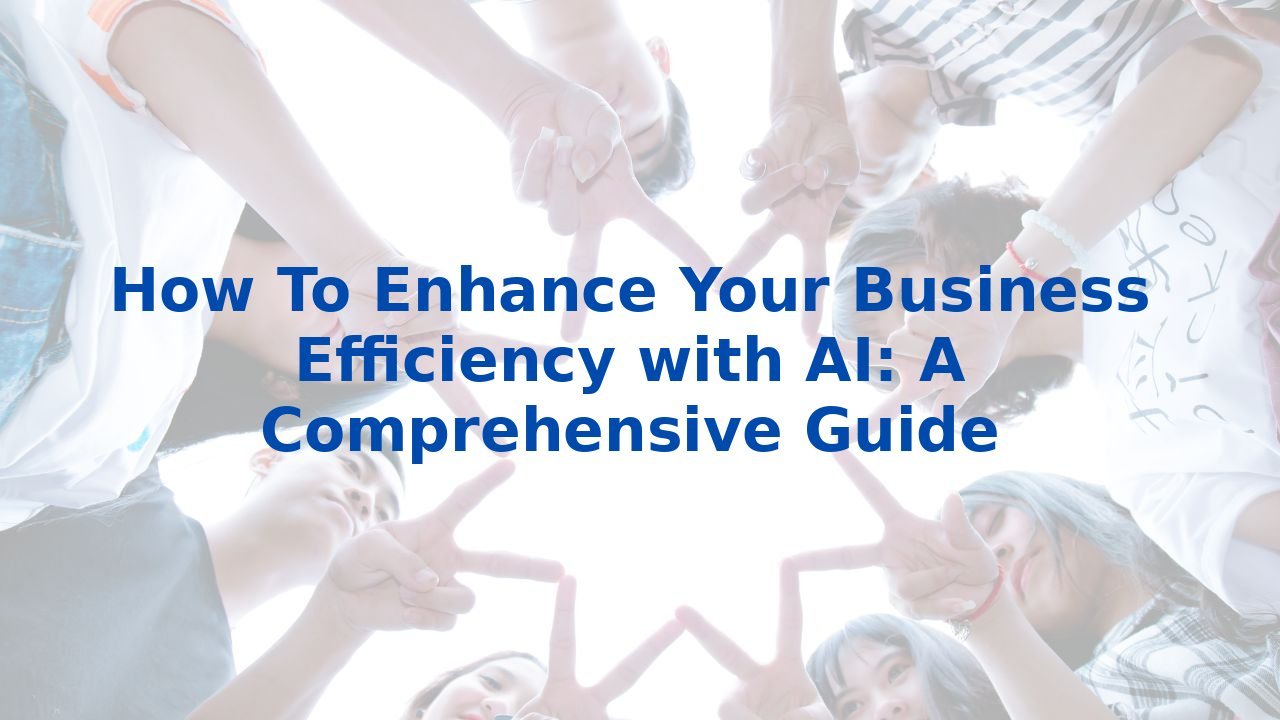How to Enhance Your Business Efficiency with AI: A Comprehensive Guide
Enhancing Business Efficiency with AI: A Comprehensive Guide
Introduction
In today's fast-paced business landscape, where adaptability can make or break an organization, the quest for efficiency is relentless. Enter Artificial Intelligence (AI)—a transformative force capable of revolutionizing business operations. This guide dives into how AI can enhance various business processes, ultimately streamlining workflows and boosting overall productivity.
Automating Routine Tasks
One of the standout capabilities of AI lies in its ability to automate routine tasks. Think of mundane processes like document processing, data entry, and form filling. Intelligent Document Processing (IDP), for example, allows AI to extract critical data from documents autonomously, without human intervention. By minimizing the risk of errors while significantly reducing the time spent on these tasks, businesses can redirect their manpower towards more strategic initiatives.
Improving Decision Making
With a wealth of data at our fingertips, making well-informed decisions has never been more crucial. AI enhances this decision-making process by delivering predictive recommendations rooted in data pattern analysis. Business analysts can leverage predictive models to evaluate various scenarios, such as the impact of pricing changes on profitability. In an environment where every decision counts, the power of AI provides the insights to act with confidence and foresight.
Enhancing Customer Service
In an era of heightened customer expectations, AI emerges as a vital asset for optimizing customer service. Its capabilities extend from analyzing customer feedback to deploying chatbots that field basic inquiries. This not only lifts the burden on customer service teams but also ensures that customer interactions are handled promptly and efficiently. Furthermore, AI's ability to evaluate the quality of customer service allows organizations to make real-time adjustments, enriching the customer experience at every touchpoint.
Optimizing Supply Chain Management
The supply chain process can be immensely complex, with numerous moving parts to monitor. AI streamlines this by analyzing purchase data and identifying anomalies in real-time. Imagine an AI model that can alert retailers to unusual spikes in product demand, enabling timely restocking decisions. Coupled with Robotic Process Automation (RPA), AI can connect to supplier systems, facilitating swift order placements while minimizing human error.
Enhancing Sales and Marketing
Sales teams thrive on insights, and AI analytics embedded within Customer Relationship Management (CRM) systems can provide transformative insights. For instance, AI can determine which customers are most likely to yield added revenue or are at risk of churn, allowing sales representatives to prioritize high-value prospects. Additionally, chatbots act as a seamless link in the sales process, offering immediate support and naturally driving revenue growth.
Improving Product Development Processes
AI's influence isn't limited to operational efficiency; it can also reshape product development. Generative design technology utilizes AI to explore all potential designs that meet specified criteria, thereby saving resources and minimizing prototype expenses. Furthermore, by automating content generation—ranging from product descriptions to marketing copy—teams can focus their creative energies on strategic initiatives, fostering innovation.
Enhancing HR Processes
In the realm of Human Resources, AI serves as a powerful ally in streamlining recruitment and employee onboarding processes. By synthesizing data points including performance metrics and market trends, AI assists in preparing competitive and equitable salary offers. Additionally, automating routine administrative tasks, such as managing employee inquiries, allows HR professionals to devote their attention to more meaningful engagements.
The Role of AI in Business Process Management
At the heart of business process management lies the triad of data analysis, process building, and automation. AI excels in constructing efficient workflows based on historical data while continuously monitoring these processes for potential issues. The result? A data-driven insight engine that promotes sustainable improvements across various operational functions.
Training Employees for AI
As we integrate AI into business processes, the human element remains paramount. Equipping employees with the knowledge and skills to leverage AI effectively is critical. Comprehensive training programs should focus on interpreting AI-driven insights and integrating AI tools into daily tasks. By doing so, organizations not only maximize the efficiency of their AI systems but also foster a culture of innovation where employees feel empowered to make impactful decisions.
Conclusion
To wrap it all up, the integration of AI into business processes is not merely an option; it's a strategic imperative for organizations aiming to thrive amidst stiff competition. From automating routine tasks to enhancing customer service and empowering employees, AI holds the potential to unlock new levels of efficiency and productivity. By embracing AI and committing to training initiatives, organizations can secure a bright and competitive future.
For organizations keen on embarking on this transformative journey, exploring training options and resources can be a crucial first step. Visit the Complete AI Training Homepage to discover more about empowering your workforce with AI skills.



